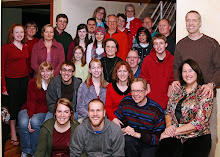Welcome to my first blog. People have been telling me for quite awhile that I need a blog. Here it is. I will use it to display information and to make comments about important events in the church and beyond. I'm going to start by posting the sermon point I didn't get to preach last Sunday (August 12th) due to time constraints. Here goes.
New Wine Needs New Wineskins
Luke 5:33-39
Point One: The Shift from Law to Grace
Point Two: The Shift from Modern to Postmodern
Point Three: The Shift from Churchianity to Christianity
A. In the modern era the church managed to hang on to its’ established place in the center of society. Most people went to church on Sunday. Businesses were closed on Sunday. Before the rise of public education churches taught most of the population how to read and write. Churches were the source of census information. They kept the birth and death records. Up until a few hundred years ago the church was vital to the functioning of everyday life in Western society. It was an institution. That’s all changed. Now church is an optional experience in the minds of people. Most unchurched people can’t imagine why they’d want to give up a weekend morning to spend at church when they could be out on the golf course, or camping, or hiking, or even grocery shopping. McNeal (in The Present Future:Six Tough Questions for the Church) says he likes to get church leadership teams into a popular restaurant on Sunday morning and then ask them, “now how many of the people you see got up this morning and said, ‘should I go to church or go out for breakfast?’” The answer is none. Going to church was no where on their radar screen. Why?
1. Because in the minds of a lot of people church is a club for people who look alike, talk alike, act alike, and vote alike. It’s a place where people go and put on a front, act like they’re better than they are, sing old music, talk in a religious language you can’t understand unless you’re one a club member. It’s a place where someone gets up, lectures everyone, and answers questions most people (outside of the club) aren’t even asking. (Post-modern’s don’t like being lectured or preached at. They do like interactive conversations about relevant subjects.)
2. The church in the New Testament was a movement. A movement with a message that changed lives, transformed whole communities, reflected the values of God, cared for the poor and the outcast. A movement where people who had failed in life were welcome and people whose lives were in turmoil could find hope and encouragement. A movement that offered people help and healing. It was a movement that took risks to reach people. A movement that depended day to day on the power of God.
3. I heard a great sermon last Sunday at Mars Hill, an emergent church. The pastor was talking about what happens to movements. Movements of God are sort of messy and chaotic and no one’s sure what’s going to happen next because God is in charge and He doesn’t reveal it ahead of time. The problem is, movements eventually become institutions. People think they need to get better organized and they want to hang on to all the great things they’ve accomplished, so they start to focus on knowing how many people are here, and how are we going to fund what we're doing, what are the membership procedures, and we need some better bylaws. That’s accompanied by a mentality of we can’t rock the boat or offend anyone or they might leave, and if too many leave what will happen to the funding and morale. Institutions are by nature change-resistant, which means they don’t want to take risks. They manage to hold their own for awhile, sometimes quite awhile, but they eventually move on the next phase. They become museums. Nothing can change. People talk about back in the 60’s, when God showed up, some great things happened. And weren’t those days wonderful! All the focus is on the past. And they ask why God isn’t doing powerful work now, when they’ve kept everything the same. Somewhere they lost track of the Bible verse that says, “See, I am doing something new.” And, “Sing to the Lord a New Song.”
4. McNeal says we have to de-convert from Churchianity and that means finding ways to become a movement again, to get comfortable with some chaos again, to welcome change again, to take some risks to reach people again, to get our eyes off of the past, and on to the present and the future. Amen.
I welcome your thoughts and responses.
--Pastor Keith
Tuesday, August 14, 2007
Subscribe to:
Posts (Atom)
